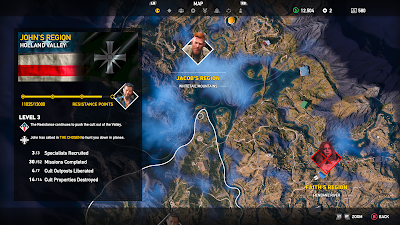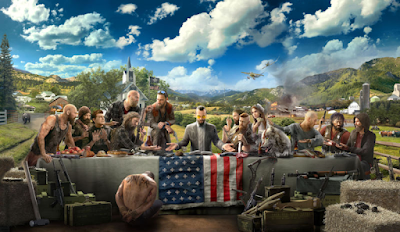When performing criticism of a videogame, I feel that playing it some time after its release presents certain advantages: firstly, we are removed from the marketing hype that has built up some expectations in the player, which may or may not be delivered by the game itself. Next, the game is in a more ‘complete’ state after additions, game of the year editions, and various patches are applied. Lastly, in some cases, there is a removal from the particular social moment of the game’s release which can provide a new lens through which to view the game. This three-part defamiliarization adds up to provide an interesting, and I think, beneficial perspective from which to review a game. This is not to say that this five-years-late review is the proper way to consider a game, certainly I wouldn’t preference one method above the other in absolute terms. However, in my overall pursuit to use criticism to add meaning to games rather than to provide a buyer’s guide, then I feel this approach is just as valid as any other.
Playing Ubisoft's Far Cry 5 (FC5) in 2023 is certainly an experience
unlike any other. The game follows the now well-established structure of the
Far Cry series which involves a discrete chunk of territory being gradually 'liberated’
from a hostile force through individual, guerilla-style tactics. The silent
player-character arrives as an outsider who works with locals to unite a resistance
and turn the tide on the enemy forces. In this case the “Project at Eden’s Gate”
is a Christian doomsday cult whose charismatic, hipster-styled leader Joseph
Seed is bent on preparing his flock for the great collapse of society. He and
his three siblings (Jacob, Faith, and John) have taken violent control of the
fictitious “Hope County” set in the American state of Montana.
The game was originally released in early 2018, half-way
through the (first?) Trump presidency. I played it in 2023 toward the end of
Biden’s first term and well into election season. FC5 is pre-pandemic media in
which COVID-19 has not yet occurred, but the political polarization had definitely
accelerated in those post-Obama years. We can only make general assumptions
about the development process and schedule, so while presumably the game was
well underway prior to Trump being elected, some significant overlap does exist.
For instance, there is a fairly clear reference to a now-infamous
videorecording that may or may not actually exist, documenting Donald Trump
engaging in a sexual urination fetish. The game does not name any names, but
the interpretation is hard to avoid.
Certainly, the American history of doomsday cults and
isolationist movements predates Trump and the current MAGA radicalization of
the Republican party. Between the founding of the Mormon and Scientologist
churches, movements such as Jonestown and the Bundy stand-off in Oregon, there
has been ample inspiration for the Eden’s Gate cultists prior to the MAGA
movement. Having played the game after 2016, and after January 6 in
particular, though, the fantastical predictions of the game may not go far
enough to be effective.
The story, missions, and inhabitants of Hope County often refer to the social-political situation of the United States throughout the game. The country, and indeed the world, is said to be ‘on the brink’ of the ‘Great Collapse.’ There are references to ’globalist conspiracies’ in story missions, which carry a fairly easily interpreted connection to anti-Semitic views. ‘Prepper stashes’ are an important source of weapons, money and upgrades throughout the game. Semi-random NPC barks include phrases like “look who’s in charge!” which Steven Strom at Ars Technica interprets to mean Donald Trump. I am not as sure of that one. Given the timeline, an Obama-like could have been president, and generally speaking, those who reject the federal government and take up arms in their own defense are right-wingers. It is difficult to decide definitively who is president during the time of the game. That incoherence is a common problem that does plague FC5 throughout.
Many critics have cited this lack of coherence and a wild
tonal dissonance as an issue with FC5 as a story-telling artifact. Anderw
Webster at the Verge, Keza MacDonald at the Guardian, Ben Kuchera, Steven
Strom, and more all seem to agree that while the game is fun to play, that the
story is disappointing in the extreme. Most cite the jarring shifts between comedic
satire embedded within many side missions with the genuinely awful depictions
of violence by Eden’s Gate as a failure of the storytelling.
I also observed some very strong deus ex machina in
the instances when Faith’s hallucinogenic “Bliss” or Jacob’s “capture parties”
would kick in and load the player character into the next chunk of main
storyline. No matter the situation or the player-character’s level of
preparation or skill, there was no defense against these instances—the game
simply whisks the player away to endure the next milestone. At one point, I was
somehow captured out of the cockpit of a helicopter flying across the county. MacDonald
describes these experiences as “being briefly kidnapped into a different game
entirely,” and I don’t disagree. That ‘other’ game would probably have had a
home in the Bioshock franchise, so strong were the ‘would you kindly’ vibes that
permeated trips into the Seeds’ underground bunkers.
Apart from the shifts in tonality of the game and gameplay, Ben Kuchera (Polygon) takes particular issue with the incoherence and contradictory characterization of the Eden’s Gate cultists. “Far Cry 5’s story starts on a hollow note and never improves,” he says. “It’s a timely story that could at least try to address the polarized nature of current American politics, or talk about the issues inherent in a country that seems to worship firearms. But I never saw anything that hinted at how these cultists were radicalized. And their ultimate goal, revealed at the end of the game, undercuts any grand statement.”
It seems to Kuchera that “Ubisoft wanted the evocative art
of these [Christian] religious references for the marketing of Far Cry 5, but
the game itself is too timid to do anything with them, let alone dig into their
historical baggage.”
Kuchera’s point is built on a solid foundation of evidence—the game is incoherent, the cult is wildly over-resourced and yet fairly superficial. The purported good guys also dirty their hands with the torture of prisoners themselves, for example. So, as a literary structure, Eden’s Gate is somewhat fragile. That being said, in 2023, I am struck by how realistic that very incoherence is.
My suspicion is that Kuchera (among others) is looking for a
believable set of principles, flawed or skewed as they may be, that consistently
motivate the antagonists in FC5. There should be some kind of throughline which,
if certain premises are accepted, create a logical chain of thought from
beginning to end, where the takeover of Hope County makes sense.
My contention here is that the real-world personalities
currently pushing similar agendas are just as incoherent, just as
contradictory, and are at least as superficial (especially in their purported
religious faith) as the so-called ‘Peggies.’ Both Kuchera and Steven Strom
suggest that the cult’s Christian iconography is little more than wallpaper.
Strom says explicitly that the cult is “vaguely Christian” which I have trouble
reconciling with the near constant quotations of Revelations by the major
characters, along with the named sins being carved into the flesh of various
characters throughout. This is not a vague Christianity—it may be a superficial
one, but it is certainly explicit. Their use of Christianity as a vehicle to legitimate
their authority is similar, perhaps, to the use of a Bible as a photo op prop by
Donald Trump outside St. John’s Episcopal Church in June 2020. Although many
would argue that Trump’s fake tan is deeper than his Christian values, there is
nothing ‘vague’ about which religion he uses to legitimate his authority and whose
favor he seeks when doing so.
From my secular, even agnostic personal perspective, there seems to be a running coincidence among the American politic whereby a certain kind of conservative is more than happy to don the accoutrement of Christianity in order to improve their standing among the population, whether they have a genuine faith or not. Christianity, meanwhile, seems to be particularly vulnerable to being put to use justifying radical political perspectives, by true believers and charlatans alike. (Perhaps this is a naïve observation since there are numerous societies whose leaders are either anointed by the church or are believed to be semi-divine themselves. But the United States is not supposed to follow in that mold.)
I won’t go so far as to say that Ubisoft and Dan Hay
specifically wrote an incoherent story to represent the incoherence I am
describing here. We are too far into ‘death of the author’ territory for that.
However, I do find it interesting to play a game where the most religious
Americans are also the most violent. I find it familiar to see that religion,
and Christianity explicitly, can be made to justify acts of brutality,
even while preaching the words of Jesus Christ. This is not, to me, hugely dissimilar
to the current state of the GOP, whose putative national leader is a prideful,
wrathful, serial adulterer, while their new Speaker of the House has styled
himself as a modern Moses.
From my perspective in 2023, reality seems to have actually
outpaced the commentary—chaotic and uneven as it is—that was embedded in FC5. Writing
for Forbes, Eric Kain mentions that the game is not an out-right condemnation
of conservatism: “Indeed, most of the good guys are red-blooded Americans
wearing flags on their T-shirts. I've never seen so many American flag shirts
in my life.” From my perspective in 2023, however, the fact that the flags worn
by these good guys are the actual, unedited American flag is in fact ‘liberal’
or at least not as radical as what the current-day right-wing MAGA crowd tend
to display. In 2023, doctored versions of the American flag (the ‘thin blue
line’ for example) are the least offensive example—the Confederate flag and
even Nazi swastikas are just as likely to be flown by the right-wing public.
In that sense, if there was a similar conflict today, between one group of Christo-fascists and another generally Republican group of conservatives, and the first group was flying Confederate flags while the second bore the real American flag, I know who I would consider the more patriotic, the least radical, the least ‘conservative’ as far as that word makes sense anymore. In this sense, the Eden’s Gate edition of the US flag, with its truncated Scientology cross replacing the white stars doesn’t go far enough in reimagining the American federation.










No comments:
Post a Comment